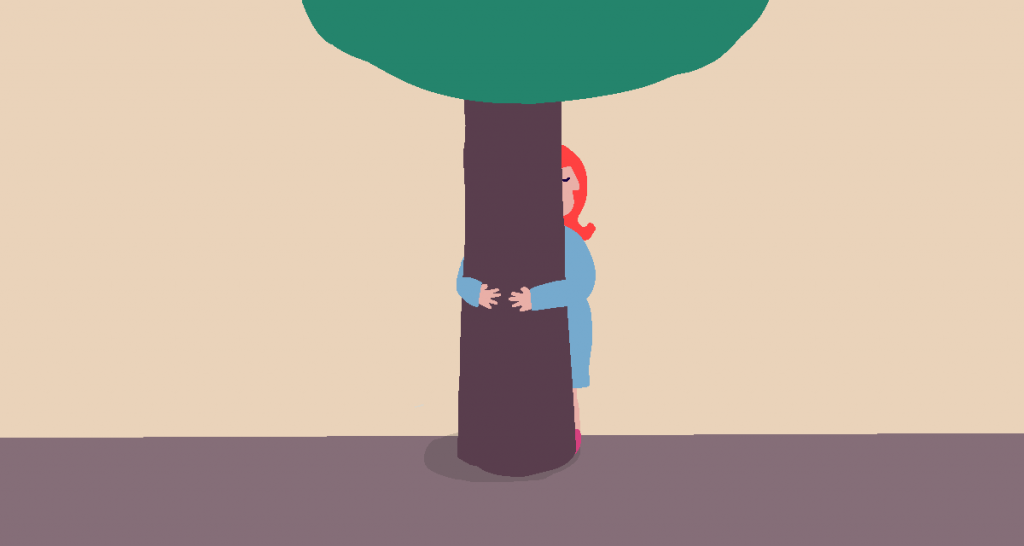Hug another being today!
When was the last time you hugged a tree, a dog, or a person? I hope it was just a few minutes ago. I have friend who makes a point of giving and receiving at least five hugs a day. What an awesome prescription for health!
When visiting South American countries over the last year, I was struck by what a strong hugging culture exists there, in comparison to countries like Canada or Belgium where we are seemingly hug-deprived. My time in Ecuador was filled with the most hugs. It was so comforting, I did not want to leave.
The neuroeconomist and oxytocin proponent Paul Zak recommends at least eight hugs a day for a happy life and better relationships, while the social worker and founder of family therapy, Virginia Satir, recommended “4 hugs a day for survival, 8 hugs a day for maintenance and 12 hugs a day for growth”.
What’s In a Hug?
Here’s what a hug can do for you:
- Hugging stimulates the production of oxytocin, the bonding hormone, which helps you connect to others and experience love. Higher oxytocin levels increase the strength of human bonding, increase our trust in others, decrease our anxiety in social situations, decrease aggressive behaviour and help us to feel calm and content in our intimate relationships. Research shows that mothers with higher oxytocin levels are more sensitive to their children’s moods, emotions and physical sensations, whereas mothers with lower oxytocin levels are likely to be more compulsive, schedule driven and task-oriented. A deficit of oxytocin may make us more susceptible to social isolation, addiction, depression, autism, anorexia and bulimia. With lower oxytocin levels, we’ll have trouble nourishing ourselves and others.
- Hugging promotes heart health. It turns out that this amazing hormone can heal injured heart tissue after a heart attack, and promote new heart muscle growth as well as wound healing. It has the ability to generate new heart cells from various types of stem cells. The higher the oxytocin, the faster and more robust is the healing post heart attack.Other effects of oxytocin on the cardiovascular system include it’s ability to:
- lower blood pressure and heart rate
- induce relaxation and blood vessel dilation through parasympathetic activation
- act as an anti-inflammatory
- act as an anti-oxidant
- stimulate the production of nitric oxide, which dilates blood vessels
Higher oxytocin levels are found in couples who are happily married and who communicate in a loving and positive way with one another, compared to couples who have less affectionate communication. The happy couples heal faster. People who are part of a support group or who have pets also heal faster, likely due to higher oxytocin.
- A hug decreases your stress response by activating the parasympathetic nervous system. Hugging can help to lower cortisol levels and activate the vagus nerve, both of which promote relaxation.
- Hugs improve emotional health, decrease loneliness and fear, relieve depression, increase self-esteem, reduce tension and show appreciation – all good things.
- Children who aren’t hugged have delays in walking, talking and reading. Hugging is therefore good for the developing brain.
- Hugging and higher oxytocin levels reduce cravings for alcohol, drugs and sweets – all of which can increase breast cancer risk.
- Hugs help to decrease inflammation and improve wound healing.
- Hugs can elevate mood, by stimulating production of the neurotransmitters serotonin, dopamine and GABA.
- Hugs enhance the immune system, which can help to protect you from infection and cancer.
So – why wait? Go find a being to hug now.
References:
Wojciak P, remlinger-Molenda A, Rybakowski J. The role of oxytocin and vasopressin in central nervous system activity and mental disorders. Psychiatr Pol. 2012 Nov-Dec;46(6):1043-52.
Strathearn L, Iyengar U, Fonagy P, Kim S. maternal oxytocin response during mother-infant interaction: associations with adult temperament. Horm Behav. 2012 Mar;61(3): 429-35
Gutkowska J, Jankowski M. Oxytocin revisited: Its role in cardiovascular regulation. Neuroendocrinol. 2012 Apr;24(4):599-608
Gouin JP, Carter CS, Pournajafi-Nazarloo H et al. Marital behavior, oxytocin, vasopressin and wound healing. Psychoneuroendocrinology. 2010 Aug;35(7):1082-90
Take the Breast Health Challenge!
Hug another being today and take a photo or make a video of you afterwards, and post on your Facebook page, Youtube or Instagram with the hashtag #breasthealthchallenge between Oct 1-31. Challenge your friends to do the same.
Sign up to receive daily tips in October: Sign Up
Let’s share what works!
Click here to see all tips
Upcoming Programs
For upcoming Healthy Breast Programs see http://mammalive.net/upcoming-courses/




